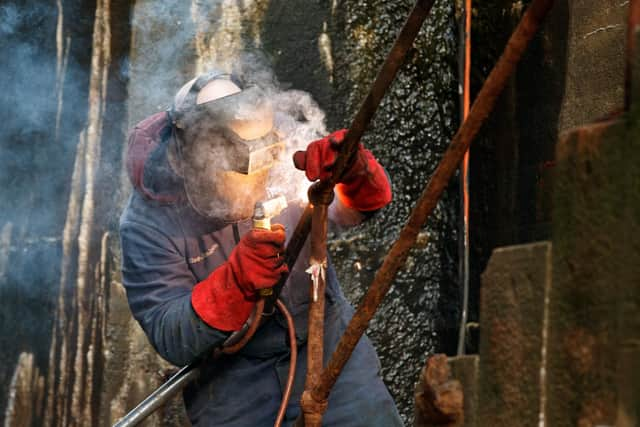UK manufacturing sector 'ends 2022 on disappointing note', as key PMI reading falls to 31-month low
Companies saw falls across output, numbers of new orders received and stocks, while prices continued to rise, although at a slower rate than before, according to the new report. The S&P Global/Chartered Institute of Procurement & Supply (Cips) UK Manufacturing PMI came in at 45.3 in December, down from 46.5 in November.
Scores below 50 are considered to show that the sector is shrinking. It is the sector's worst performance for 31 months, and – apart from the early days of the pandemic – one of the worst since mid-2009.
Advertisement
Hide AdAdvertisement
Hide AdRob Dobson, director at S&P Global Market Intelligence, said: "Output contracted at one of the quickest rates during the past 14 years, as new order inflows weakened and supply-chain issues continued to bite. The decline in new business was worryingly steep, as weak domestic demand was accompanied by a further marked drop in new orders from overseas."


It is the fifth month in a row that the manufacturing PMI score has shown that the sector is in decline, while production fell for the sixth consecutive survey. Exporters reported low demand from China, the US, mainland Europe and Ireland, largely due to weak economic conditions globally. Some companies also mentioned shipping delays, higher costs, and other issues all linked to Brexit.
Mr Dobson also said: "Clients are increasingly downbeat and reluctant to commit to new contracts, not just in the UK but also in key markets like the US, China and the EU. The weakness in the latter is still being exacerbated by the constraints of Brexit, as higher costs, administrative burdens and shipping delays encourage increasing numbers of clients to shun trade with the UK."
The pressure on the sector continued to affect staff, as the number of people employed by manufacturers dropped for the third month in a row. It was the steepest fall since October 2020.
Overshadow
Cips’ chief economist Dr John Glen said: "All these black spots managed to overshadow some of the improvements for manufacturers such as a further easing in supply-chain delays or the higher rates of activity in the investment goods sector or input price inflation easing to a two-year low.
"The overarching concerns remain that there is little power in the UK economy's engine of growth for 2023, and manufacturers were painfully aware of this as business expectations remained at historically low levels again."
Maddie Walker, industry X lead for Accenture in the UK, said: “A continued downturn in manufacturing ends the year on a disappointing note, with rising costs and deteriorating demand delivering another blow. With customers feeling the sting of inflation, muted sales in the Christmas trading period will weaken confidence and a fall in orders may put a brake on further production in the months ahead. However, we know that manufacturers have become experts at resilience. We expect to see more use of productivity and process improvement programmes to improve operational efficiency as we move into the new year.”
Martin Beck, chief economic advisor to the EY Item Club, said the data suggests the Bank of England is close to the end of its rate-rising cycle, with the bank rate “likely to peak at 4 per cent”.
Comments
Want to join the conversation? Please or to comment on this article.